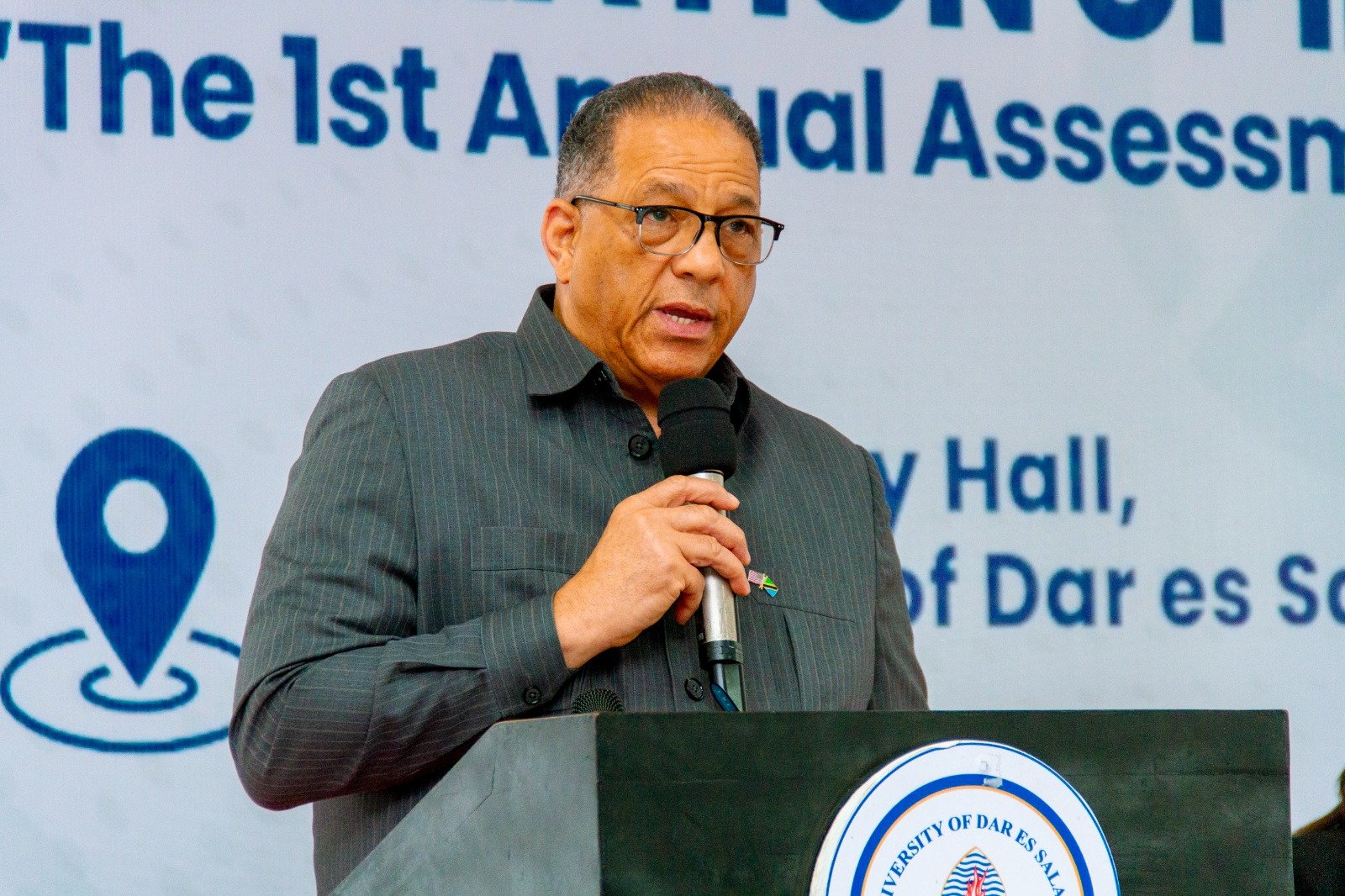Zanzibar registers projects worth Sh15 trillion in three years
These projects, registered during the three years of the eighth phase of government, are expected to create 20,000 jobs, primarily in the tourism sector.Continue Reading
Tanzania Foreign Investment news
These projects, registered during the three years of the eighth phase of government, are expected to create 20,000 jobs, primarily in the tourism sector.Continue Reading
Today, in Tanzania – as in the rest of the world – the international community comes together to mark and commemorate the International Day of Peace.Continue Reading
DAR ES SALAAM: The Tanzania Bureau of Standards (TBS) is taking proactive steps to develop standards aimed at addressing safety and security concerns related to Artificial Intelligence (AI), even though a tech expert warns that it is beyond control.
Despite these efforts, a tech expert has cautioned that the challenges associated with AI may be beyond full control and emphasised the need for awareness on responsible usage.
TBS Engineer Mohamed Kaila, speaking on behalf of his engineering colleagues after the Engineers’ Day, recently, said that AI represents the future of global technological advancement.
“This year’s celebration is unique as we are highlighting our preparations to ensure the quality of all items used in engineering projects, including those not traditionally associated with engineering,” said Eng Kaila.
This year’s Engineers’ Day theme was centred around AI and TBS engineers have proactively begun developing standards to manage the associated safety and security concerns.
He reaffirmed the bureau’s commitment to ensuring consumer safety by developing robust standards.
ALSO READ: TBS: Elevating standards for global competitiveness
Dar es Salaam Institute of Technology’s (DIT), Department of Computer Studies Lecturer, Dr Joseph Nyansiro told Daily News yesterday that around the world, governments and standards organisations are recognising the need to establish regulatory frameworks for the ethical use and safety of AI.
“Currently,” Dr Nyansiro said, “Tanzania faces certain limitations in the AI space.
“[Since] AI systems are built on complex mathematical models and algorithms, and it is inherently challenging to create a one-size-fits-all standard that can address the wide range of industries and applications where AI is used”.
Additionally, Dr Nyansiro, and IT expert said, the country lacks the specialised laboratories and technical expertise needed to develop these complex AI technologies.
“At present, we are primarily consumers of AI solutions, most of which originate from other countries,” the IT expert said.
However, he said, TBS is trying to take a significant step that aligns with a growing global trend.
Though the development of the country’s comprehensive standards and regulations specific to AI creation and deployment may not be feasible in the near term.

Get the latest in African news delivered straight to your inbox
He suggested twofold most practical approach for TBS and Tanzania as a whole as first, the country should focus on drafting guidelines that promote the ethical use of AI technologies within its borders.
And, second, the country could collaborate with global AI regulatory bodies, such as the International Organisation for Standardization (ISO) or the European Union, to ensure that international standards account for the country’s unique social and economic context.
“By adopting and customising these global frameworks, Tanzania can better safeguard its interests while remaining aligned with international best practices,” Dr Nyansiro advised.
Dr Nyansiro called up innovation regulatory bodies including TBS and others tech stakeholders to focus on the consumers’ side by ensuring that people use the AI ethically without damaging human dignity.
In this context, he advocated for a nationwide campaign to raise awareness about the responsible use of AI, rather than solely focusing on regulating innovations that are entirely foreign-based.
The ongoing development of AI standards is part of TBS’s broader commitment to advancing technology while safeguarding public interests.
By addressing emerging challenges and fostering collaboration, TBS aims to support the safe and effective integration of AI technologies into various sectors.
Overall, AI safety and security standards are essential for balancing innovation with ethical considerations and risk management, ensuring that AI technologies benefit society while minimising potential harms.
Source: allafrica.com

DAR ES SALAAM — The United States Ambassador to Tanzania, Dr Michael Battle, has praised the country for capitalising on Information and Communication Technology (ICT) to promote social and economic development.
Speaking at a gala organised in Dar es Salaam to announce the top three winners of the US-Tanzania Tech Challenge on Thursday night, the diplomat emphasised the importance of ICT, stating that “everything is online.”
The envoy encouraged the winners to leverage their ICT skills and use digital platforms to inform the public about available online resources for the betterment of the country.
“This is the possibility in front of you, a dream I challenge you to pursue. Don’t settle for small dreams. If you have small dreams, find someone with big dreams to motivate you, and together you can change the world. Aim to transform the world; you have the power to make that change,” he said.
On his part, Innovation and Technology Manager Dr. Gerald Kafuku noted that the government is increasingly investing in this sector to support ICT innovators and unlock economic opportunities.
He highlighted that the Commission for Science and Technology (COSTECH) is collaborating with development partners to support young innovators, with the goal of driving positive changes across various sectors.
Over 100 participants showcased their innovative ICT projects in the Tech Challenge, with eight advancing to the finals.
Jamii Forums emerged as the winner, receiving $100,000, while Smart Foundry came in second with $80,000, and LaunchPad Tanzania took third place, walking away with $70,000.
Source: allafrica.com

I have not paid rent since August 2021, and I have nothing to show for it. I live alone in my sister’s house. Work opportunities have been rare and sometimes I go more than two months without work.
In March, I got a short-term contract that paid Sh35,000. I worked for two months. I got another job in June that paid Sh34,000 for one month. In July, I didn’t have a job. In August, I got a job that paid me Sh50,000. Out of the Sh50,000, I would receive a daily allowance of Sh1,000.
After one month, I had received a total of Sh25,000 daily allowance. I managed to save Sh5,300 from the Sh1,000 daily allowance. We travel a lot and out of the Sh1,000 per day, I take around Sh500 to get a decent lodge without bedbugs, then about Sh200 for food. The rest is for airtime and family. As I didn’t start work on August 1, the salary was slashed by five days. I have a debt. I repay Sh2,200 and I send my parents Sh2,000.
My sister is moving in this November so I will soon start paying rent. I have been using the 50/30/20 model to save and have managed to keep Sh62,000 in an MMF (money market fund). I was using a different MMF as my emergency fund, but I have now depleted that account.
I always keep track of my money, but I don’t see where I wasted it. I have a daughter in Grade Three and paying for her school fees is a challenge. How can I invest my Sh60,000 savings? I am looking for short-term returns of at least three months that I can use for growth. We are on a two-week break, and I don’t know how long my current job will run. I might not even be recalled.
You need to determine why you are struggling to manage your finances despite having a job and trying to save. You can apply the ‘5 Whys’ technique to dig deeper into the root cause of your financial challenges.
The technique focuses on asking why a problem is occurring and then repeating “why?” four more times until you find the root cause.
From my analysis, it seems that the root cause of your financial challenges is a lack of stable, long-term employment, which could be partly due to gaps in skills or qualifications.
Addressing this root cause could involve investing in skills development or education that aligns with stable job opportunities.
It is commendable that you have identified your challenges, which include unstable income, high cost of living, debt and limited savings.
Your income has been inconsistent, with periods of unemployment and low-paying jobs.
Your daily expenses for accommodation, food, and transport are significant and consume a large portion of your income. You have existing debts and school fees to take care of.
Your savings have been depleted, and you’re struggling to build up an emergency fund.
Although you have not provided a breakdown of all your expenses, such as the amount of your child’s school fees, I would urge you to carefully track all your expenses to identify areas where you can cut back.
Consult a financial advisor to discuss debt management strategies, such as debt consolidation or repayment plans. The financial advisor can also provide personalised guidance on budgeting and saving.
Even in tough times, try to build up an emergency fund. Be cautious about borrowing additional debt unless it’s for essential needs.
Don’t hesitate to reach out to friends, family or professionals for help and advice. Assisting your parents is a good idea but you need to do it within your means. Have a candid discussion with all your dependents so that they can understand your precarious financial situation.
Consider having additional income streams to supplement your income. Explore opportunities like selling items online or providing services that match your skills.
There are various investment options that you can utilise to invest the amount of money that you are holding now. However, it’s important to consider your risk profile and the timeframe of your investment. It is good that you already have some experience with money market funds (MMFs).
The MMF ensures a return on your investment while protecting your capital. You can also grow your portfolio by making regular contributions, and the funds are readily available if you need to make a withdrawal.
By saving the Sh60,000 in an MMF at a 14 percent per annum rate, net of tax and management fees, you will have at least Sh69,000 within one year. Given your need for short-term returns and safety, the MMF might be the most suitable option for you to invest the funds.
A fixed deposit account is also an option as it can offer a safe and guaranteed return on your savings, although the returns are low.
Treasury bills and bonds and commercial papers are other investment options you can consider in the short to medium term.
You need a minimum of Sh100,000 and Sh50,000 to invest in Treasury bills and Treasury bonds respectively. However, for the infrastructure bond you require a minimum of Sh100,000.
You can invest in a 91-day Treasury bill, which is safe and typically offers higher returns than MMFs, but you will need to increase the amount you have so that you can meet the minimum amount threshold.
The average interest rate of the latest 91-day Treasury bill was 15.7502 percent and the latest infrastructure bond tap sale issue had a coupon rate of 14.3990 percent.
If you are a risk taker and don’t mind holding your money in long-term investment, you can consider investing in stocks.
If you’re open to entrepreneurship, you could consider a small-scale venture that doesn’t require a huge upfront cost but can turn profits within three months.
You need to consider joining a Sacco because they offer savings, loans, and investment products. I would encourage you to always remember to capitalise your Sacco dividends to deposits to help increase your borrowing power and earning of high dividends in the subsequent years.
Saccos are a good source of development loans because they can advance you a loan amount that is three time your savings.
However, your income sources need to be enough to afford the monthly loan instalments.
If you have any money problems, send us an email at [email protected] and leave your number for contact. Money questions will be answered on this column
The value of investment projects increased by over 60 percent to $1.61 billion in the quarter ended June 2024, according to the Tanzania Investment Centre (TIC).Continue Reading
As October approaches, all roads will lead to Zanzibar, the Indian Ocean archipelago, for the 11th Tanzania Health Summit.Continue Reading

By BOB KARASHANI
The United States Ambassador to Tanzania, Michael Battle, said on Thursday that his country had no intention of retreating from its push for strict adherence to democratic rights and principles as a key aspect of its partnership with Dodoma.
This came after President Samia Suluhu Hassan earlier this week pointedly criticised the US Embassy for leading Western diplomats in Tanzania in condemning a wave of mysterious abductions and killings that has swept the country in the run-up to local elections in November.
President Samia warned other countries to desist from interfering in Tanzania’s domestic affairs and violating the 1961 Vienna Convention on Diplomatic Relations by trying to dictate how Dodoma should handle investigations into the trend of abductions, which has heightened security concerns across the country ahead of the upcoming civic elections.
Although she did not name any mission in particular, the President singled out two recently reported assassination attempts on US presidential candidate Donald Trump as “proof” that incidents of pre-election violence were also prevalent in the West.
But, addressing a democracy conference in Dar es Salaam on Thursday, Mr Battle acknowledged that the US was not “immune to challenges and imperfections” in maintaining democratic standards as it prepares for its own presidential election this year, but remained adamant that Washington’s support for Tanzania, which he said has so far resulted in about $7.5 billion in aid commitments over the years, would remain hinged on respect for democracy and human rights.
“As long as we remain Tanzania’s partner, we will always speak openly and honestly on these principles. We will not back away or hold back. It is an obligation fundamental and paramount to human dignity and human respect,” he said.
The US mission in Dar was the first to issue a formal statement denouncing the brazen abduction and brutal killing of opposition Chadema party official Ali Mohamed Kibao two weeks ago.
Read: Ally Kibao, abducted Tanzanian opposition leader found dead, acid poured on face
In its strongly worded statement on September 9, the embassy described the incident and other recent disappearances, detentions and beatings involving political and human rights activists in Tanzania as “efforts to disenfranchise citizens ahead of (the) elections,” and called for an “independent, transparent, and prompt investigation.”
The European Union, the British and Canadian High Commissions, and Norway and Switzerland embassies followed up with a joint statement on September 10, calling for a “thorough inquiry.”
President Samia responded on September 17 in a televised speech insisting that such interventions by the diplomatic corps were not welcome and that no “outsiders” should claim to be more pained by the events than Tanzanians themselves.
“It is our own responsibility to find out why they are happening at this moment in time. We know what we need to do as a sovereign nation and do not appreciate other countries telling us to do one, two, three,” the President asserted.
Read: Tanzania abductions: Samia tells foreign envoys to keep off probe
She also questioned whether the statements had been sanctioned by the heads of State of those countries, stating: “I have my own ways of checking with my fellow presidents and will lodge formal complaints with them once I confirm that they, indeed, were.”
Representatives of the British, Canadian, Norway and Switzerland missions, who were part of the joint EU-led statement, were also present at Thursday’s forum in Dar es Salaam hosted by the Tanzania Centre for Democracy (TCD), alongside the Netherlands, France, Belgium, Sweden, Denmark, Ireland and South Africa.
The event, marking the International Day of Democracy, saw the launch of TCD’s first assessment report on the state of democracy in Tanzania, which the centre says will be published annually.
The recent upsurge in politically-linked violence has cast a long shadow over the November 28 local government elections, which are expected to provide the template for next year’s general election, in which President Samia will defend her incumbency and the ruling CCM party its majority legislative control until 2030.
Buyers of villas constructed by property developer Floton Africa in Paje are seeking intervention from the authorities in Zanzibar.Continue Reading

PRESIDENT Samia Suluhu Hassan has issued directives to the newly appointed leadership of Tanzania’s airports, demanding significant improvements in both infrastructure and operations.
Speaking at a swearing-in ceremony for various government officials at State House in Dar es Salaam yesterday, President Samia expressed dissatisfaction at the current state of the country’s airports, particularly in terms of passenger experience and system reliability.
The President instructed, the newly appointed Abdul Mombokaleo, the Director of the Tanzania Airports Authority (TAA), who took an integrity oath yesterday, saying: “Operationally and in terms of infrastructure, there have been recent issues with systems at our airports, which our international visitors often use.
I have received complaints, so you must address these problems to ensure our visitors have a comfortable experience.
Elaborating, she highlighted complaints from international visitors about operational issues and outdated infrastructure.
ALSO READ: Samia calls for unified action against crimes
The Head of State said there is still significant work to be done at Tanzania’s airports, despite the progress made so far.
She urged the officials to be innovative and ensure that the revenue generated from the airports is utilised efficiently to improve the services that visitors expect when they arrive.
President Samia also mentioned the inconsistent functionality of the fast-track system, which is frequently used by government officials.
“Many tourists also want to use fast-track services because they have travelled long distances and are exhausted, but delays dampen their spirits. Ensure that all airports receiving international visitors are in top condition.”
In addition to these appointments, Nenelwa Mwihambi was sworn in as a Judge of the High Court of Tanzania, having previously served as the Clerk of the National Assembly.
Her former position has been taken over by Idelphonce Leonard, who was also sworn in at the State House. Other officials who took oath of integrity include Mombokaleo as the Director of TAA, Mr Salim Msangi as the Director General of the Tanzania Civil Aviation Authority (TCAA) and Macrice Mbodo as the Postmaster General.
Source: allafrica.com
Zanzibar Investment News Tanzania Investors Ltd © 2025